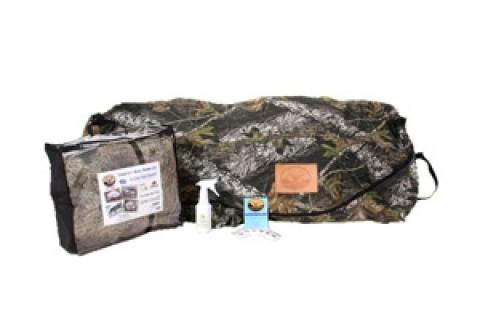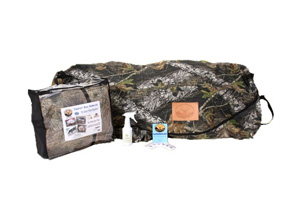
 |
| The Trophy Bag Kooler System is a great way to not only keep your game clean but also cool. |
For many hunters, a winter's supply of tasty, low-fat and healthy game meat for the family is the main reason they pursue deer, moose, elk, caribou, sheep or bear each year. For others, the quest to harvest a trophy animal is their main motivation, and the venison is secondary. In fact, many hunters even end up donating their meat to local soup kitchens or other organizations such as Farmers and Hunters Feeding the Hungry to help feed those in need. Regardless of what you wish to do with your game meat, it is incumbent upon you to take care of it from the moment your quarry is down. In fact, it is the law, as it is an offense in most jurisdictions to abandon or otherwise allow the edible flesh of any game animal to spoil. Here are some tips:
- Plan Ahead. Whether you are hunting in your backyard or a long way from home, think about how you are going to get your meat home. If you are using a guide/outfitter, ask about local butchers or meat lockers. If you are driving, make sure you have a cooler big enough to transport your meat. If flying, check your airline's website for their rules in terms shipping containers, weight limits, cost, etc.
- Be Prepared. As with many things in hunting, prior preparation is the key, especially if you are hunting during the early season when temperatures are mild and meat can spoil the quickest. One of the best ideas I've seen in a long time is the Trophy Bag Kooler System, which apparently does an incredible job of keeping your animal clean and cool, both in the field and during transport.
- Have the Right Tools. If you are deer hunting and are planning to have your meat professionally butchered, you can probably get by with a just a folding knife to gut the animal. If you are hunting moose, however, and plan to do most of the butchering yourself and in the field, you are going to need a lot more serious additional tools, including skinning knives, bone saws, etc. A great option is one of the many fine quality game processing sets that are now available that contain everything you will need in a handy carrying case to put in your field pack.
- How To. Having the right tools is only half the battle. Knowing what to do is just as important. Whether you are just gutting your animal, or skinning, quartering and butchering it yourself as well, many of the manufacturers of the various tools mentioned above have some great how-to information on their websites. There are also countless videos on YouTube that illustrate various ways of doing just about everything there is to do when it comes to caring for your game.
- Keep it Clean. Once you've got your animal skinned, you need to be careful to keep the meat clean and free of bugs. Cheese cloth or other such game bags for deer and for elk do a good job overall, and hunters have been sprinkling black pepper on their animal carcasses for decades to keep blow flies from landing and laying eggs.
- Know the Law. Due mainly to concerns over such things as Chronic Wasting Disease, most jurisdictions now have laws dealing with the importation, or even just onward transportation, of animal parts from outside jurisdictions. Research those rules and abide by them, as well as regulations in the jurisdiction you are hunting pertaining to transporting your animal with proper tags or licensing information visible, evidence of sex, etc.
- Immediate Tracking. Bowhunters are taught almost from birth that any deer shot in the afternoon that doesn't drop within sight must be left overnight to expire, rather than tracked and recovered immediately. This is something that I admit I was a proponent of for many years, due in part to the fact that I do most of my hunting in cold weather when spoilage of meat is less of a concern. But I recently had my eyes opened to the fact that this practice can and does result in a lot of spoiled meat, especially during early season hunts, and this is quickly becoming a pet peeve of mine. Another very real problem in many areas is coyotes getting to the deer first and leaving little for the hunter to recover. I realize that pushing a deer after a marginal shot can result in the animal travelling much further than it may have otherwise, thus reducing the chances of recovering. I'm just suggesting that each situation should be considered in the context of all its circumstances and a reasoned decision made whether to track immediately or leave overnight.
Good hunting.
- 6116 views

